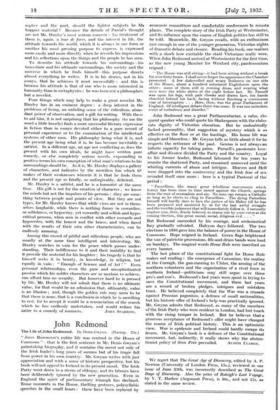John Redmond
The Life of John Redmond. By Denis Gwynn. (Harrap. 25s.)
" JOIIN REDMOND'S entire life was centred in the House of Commons "—that is the first sentence in Mr. Denis Gwynn's painstaking biography, and it contains the secret not only of the Irish leader's long years of success but of his tragic fall from power in his own country. Mr. Gwynn writes with just appreciation and with a sense of historic perspective, but his book will not appeal to Ireland in its present mood. The Irish Party went down in a storm of obloquy, and its labours have been deliberately ignored by the new generation. Even in England the spirit of parliamentary triumph has declined. Tense moments in the House, thrilling gestures, polysyllabic speeches in the small hours : these have been replaced by economic committees and comfortable conferences In remote places. The complete story of the Irish Party at Westminster, and its influence upon the course of English politics has still to be told. Meanwhile, Mr. Gwynn recalls, with an enthusiasm rare enough in one of the younger generation, Victorian nights of dramatic debate and closure. Reading his book, one realizes with a shock how excitable the staid Victorians really were: When John Redmond arrived at Westminster for the first time, as the new young Member for Wexford city, pandemonium reigned :
"The House was still sitting—it had been sitting without a break for over forty hours. I shall never forget the appearance the Chamber presented. A few dishevelled and weary Irishmen on one side of the House, about a hundred infuriated Englishmen upon the other ; some of them still in evening dress, and wearing what once were the white shirts of the night before last. Mr. Parnell was upon his legs, with pale cheeks and drawn face, his hands clenched behind his back, facing without flinching a continuous roar of interruption . . . Here, then, was the great Parliament of England. Of intelligent debate there was none. It was one unbroken scene of turbulence and disorder."
John Redmond was a great Parliamentarian, a calm, elo- quent speaker who could quote his Shakespeare with the elabo- rate dignity of Victorian elocution. But he undoubtedly lacked personality, that suggestion of mystery which is so effective on the floor or at the hustings. His home life was simple and blameless : Mr. Gwynn tells us little about it for he respects the reticence of the past. Genius is not always an infinite capacity for taking pains. Parnell's passionate love- affair and divorce divided the Party and the country. Loyal to his former leader, Redmond laboured for ten years to reunite the shattered Party, and remained unmoved amid the whirling currents of abuse and intrigue. Heaven and Hell were dragged into the controversy and the Irish fear of sex revealed itself once more : here is a typical Pastoral of the period :
" Parnellism, like many great rebellious movements which heresy has from time to time raised against the Church, springs from the root of sensualism and sin. No man can remain a Catholic as long as he elects to cling to Parnellism. The dying Parnellite himself will hardly dare to face the justice of his Maker till he has been prepared and anointed by us for the last awful struggle and the terrible judgment that will irrunediately- follow it. I earnestly implore you, then, dearly beloved, to stamp out by your votes at the coming election, this great moral, social, religious evil . .
But Redmond succeeded by his courage, and ecclesiastical fury gradually subsided. Halcyon days followed. The two elections in 1910 gave him the balance of power in the House of Commons. Hope reigned in Ireland. Green flags brightened the van of patriotic processions, fife-and-drum bands were loud on Sundays. The magical words Home Rule were inscribed on every banner.
The last phase of the constitutional fight for Home Rule makes sad reading : the emergence of Carsonism, the mutiny at the Curragh, the gun-running to Ulster, the arniing of the northern volunteers and the organization of a rival force in southern Ireland—politicians may still argue over these pro's and con's. Redmond's last years were spent in trying to save the Constitutional movement, and these last years are a record of broken pledges, intrigues and mistaken trust. He believed completely that the War was a crusade against Prussian paganism, a defence of small nationalities, but his historic offer of Ireland's help was practically ignored. Mr. Gwynn admits that Redmond, as many of the members of the Irish Party who were resident in London, had lost touch with the rising temper in Ireland. But he believes that a generous acceptance of Redmond's offer might have changed the course of Irish political history. This is an optimistic view. War is epidemic and Ireland could hardly escape its fevers. Mr. Gwynn's book is a defence of the Constitutional movement, but, indirectly, it really shows why the absten- tionist policy of Sinn Fein prevailed. AUSTIN CLARICE.






































 Previous page
Previous page